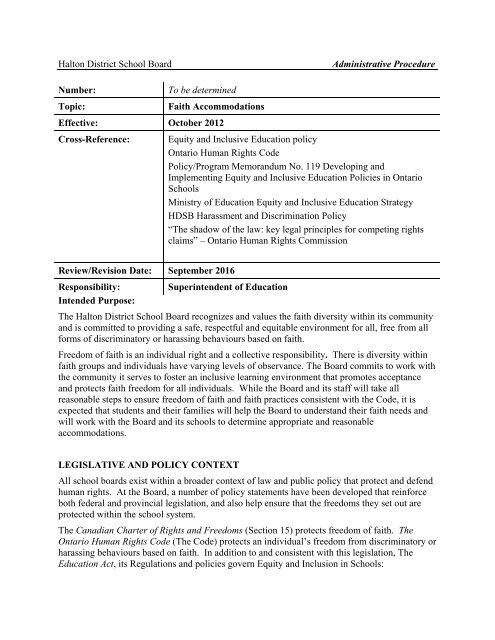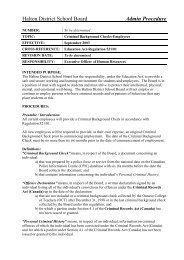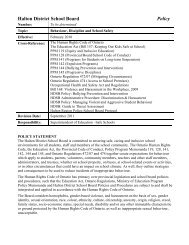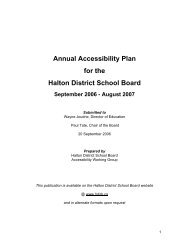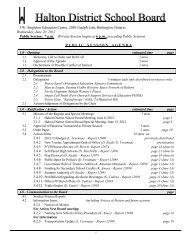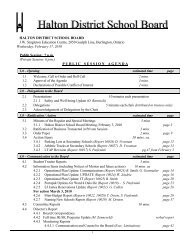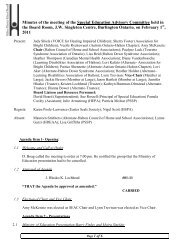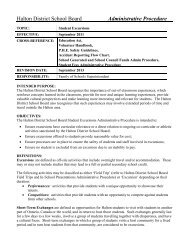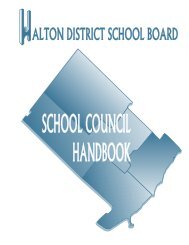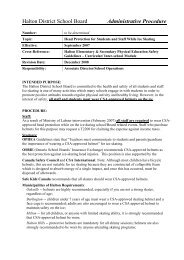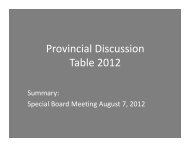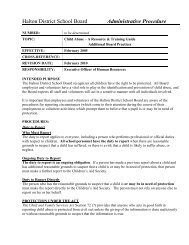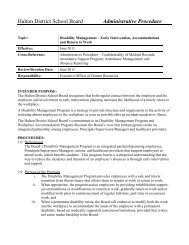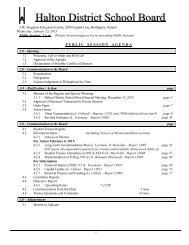Faith Accommodation - Halton District School Board
Faith Accommodation - Halton District School Board
Faith Accommodation - Halton District School Board
Create successful ePaper yourself
Turn your PDF publications into a flip-book with our unique Google optimized e-Paper software.
<strong>Halton</strong> <strong>District</strong> <strong>School</strong> <strong>Board</strong><br />
Administrative Procedure<br />
Number:<br />
Topic:<br />
To be determined<br />
<strong>Faith</strong> <strong>Accommodation</strong>s<br />
Effective: October 2012<br />
Cross-Reference:<br />
Equity and Inclusive Education policy<br />
Ontario Human Rights Code<br />
Policy/Program Memorandum No. 119 Developing and<br />
Implementing Equity and Inclusive Education Policies in Ontario<br />
<strong>School</strong>s<br />
Ministry of Education Equity and Inclusive Education Strategy<br />
HDSB Harassment and Discrimination Policy<br />
“The shadow of the law: key legal principles for competing rights<br />
claims” – Ontario Human Rights Commission<br />
Review/Revision Date: September 2016<br />
Responsibility:<br />
Intended Purpose:<br />
Superintendent of Education<br />
The <strong>Halton</strong> <strong>District</strong> <strong>School</strong> <strong>Board</strong> recognizes and values the faith diversity within its community<br />
and is committed to providing a safe, respectful and equitable environment for all, free from all<br />
forms of discriminatory or harassing behaviours based on faith.<br />
Freedom of faith is an individual right and a collective responsibility. There is diversity within<br />
faith groups and individuals have varying levels of observance. The <strong>Board</strong> commits to work with<br />
the community it serves to foster an inclusive learning environment that promotes acceptance<br />
and protects faith freedom for all individuals. While the <strong>Board</strong> and its staff will take all<br />
reasonable steps to ensure freedom of faith and faith practices consistent with the Code, it is<br />
expected that students and their families will help the <strong>Board</strong> to understand their faith needs and<br />
will work with the <strong>Board</strong> and its schools to determine appropriate and reasonable<br />
accommodations.<br />
LEGISLATIVE AND POLICY CONTEXT<br />
All school boards exist within a broader context of law and public policy that protect and defend<br />
human rights. At the <strong>Board</strong>, a number of policy statements have been developed that reinforce<br />
both federal and provincial legislation, and also help ensure that the freedoms they set out are<br />
protected within the school system.<br />
The Canadian Charter of Rights and Freedoms (Section 15) protects freedom of faith. The<br />
Ontario Human Rights Code (The Code) protects an individual’s freedom from discriminatory or<br />
harassing behaviours based on faith. In addition to and consistent with this legislation, The<br />
Education Act, its Regulations and policies govern Equity and Inclusion in <strong>School</strong>s:
PPM No 108, “Opening or Closing Exercises in Public Elementary and Secondary <strong>School</strong>s”,<br />
R.R.O. 1990, Regulation 298, “Operation of <strong>School</strong>-General” s 27-29, under the heading “<strong>Faith</strong><br />
in <strong>School</strong>s”<br />
PPM No. 119, “Developing and Implementing Equity and Inclusive Education Policies in<br />
Ontario <strong>School</strong>s”.<br />
The <strong>Board</strong> recognizes, and is committed to, the values of freedom of faith and freedom from<br />
discriminatory or harassing behaviour based on faith through its human rights policies, equity<br />
and inclusive education policy, safe schools policy and curriculum documents. All of these will<br />
be informed by, and interpreted in accordance with, the principles of the Code.<br />
GUIDELINES FOR ADMINISTRATORS<br />
When you receive a request from a parent about faith accommodations, tell the<br />
parent you will arrange a meeting with <strong>Board</strong> personnel to discuss their request.<br />
Contact either the System Principal Community Engagement or the Equity and<br />
Inclusive Education Coordinator for assistantce with the parent meeting.<br />
Discussion between families and school staff about faith accommodations should be<br />
entered into with a sense of mutual respect, building trust and understanding.
FAITH ACCOMMODATION GUIDELINES<br />
APPENDIX A
FAITH ACCOMMODATION GUIDELINES<br />
The purpose of this guideline is to ensure that all <strong>Board</strong> staff, students, parents and other<br />
members of the school community are aware of their rights and responsibilities under the Code<br />
with respect to faith accommodation. It also sets out the <strong>Board</strong>’s procedures for accommodation<br />
and the responsibilities of each of the parties to the accommodation process. In accordance with<br />
the Equity Strategy, the Code and OHRC’s Guidelines on Developing Human Rights Policies<br />
and Procedures, it is intended that the accommodation process, as well as the accommodation<br />
itself, be effective and respectful of the dignity of accommodation seekers.<br />
The <strong>Board</strong> is committed to providing an environment that is inclusive and that is free of barriers<br />
based on creed (faith). <strong>Accommodation</strong> will be provided in accordance with the principles of<br />
dignity, individualization, and inclusion. The <strong>Board</strong> will work cooperatively, and in a spirit of<br />
respect, with all partners in the accommodation process.<br />
I. DEFINITIONS<br />
1. <strong>Accommodation</strong><br />
The Ontario Human Rights Commission’s Policy on Creed and the <strong>Accommodation</strong> of <strong>Faith</strong><br />
Observances define “accommodation” as a duty corresponding to the right to be free from<br />
discrimination:<br />
The Code provides the right to be free from discrimination, and there is a general corresponding<br />
duty to protect the right: the “duty to accommodate.” The duty arises when a person’s faith<br />
beliefs conflict with a requirement, qualification or practice. The Code imposes a duty to<br />
accommodate based on the needs of the group of which the person making the request is a<br />
member. <strong>Accommodation</strong> may modify a rule or make an exception to all or part of it for the<br />
person requesting accommodation.<br />
(Policy on Creed and the <strong>Accommodation</strong> of <strong>Faith</strong> Observances, Ontario Human Rights<br />
Commission, October 20, 1996, pg. 5)<br />
The duty to accommodate is an obligation that arises when requirements, factors, or<br />
qualifications, which are imposed in good faith, have an adverse impact on, or provide an unfair<br />
preference for, a group of persons based on a protected ground under the Code. The duty to<br />
accommodate must be provided to the point of undue hardship. In determining whether there is<br />
undue hardship, section 24(2) of the Code provides that reference should be made to the cost of<br />
accommodation, outside sources of funding, if any, and health and safety requirements.<br />
2. Creed (<strong>Faith</strong>)<br />
Creed is interpreted by the Ontario Human Rights Commission’s 1996 Policy on Creed and the<br />
<strong>Accommodation</strong> of <strong>Faith</strong> Observances as “faith creed” or “faith.” It is defined as a professed<br />
system and confession of faith, including both beliefs and observances of worship.<br />
The existence of faith beliefs and practices are both necessary and sufficient to the meaning of<br />
creed, if the beliefs and practices are sincerely held and/or observed.
According to the Ontario Human Rights Commission, every person has the right to be free from<br />
discrimination or harassing behaviour that is based on faith or which arises because the person<br />
who is the target of the behaviour does not share the same faith. Atheists and agnostics are also<br />
protected under the Code.<br />
Creed does not include secular, moral, or ethical beliefs or political convictions. This policy<br />
does not extend to faiths that incite hatred or violence against other individuals or groups, or to<br />
practices and observances that purport to have a faith basis, but which contravene international<br />
human rights standards or criminal law (Policy on Creed and the <strong>Accommodation</strong> of <strong>Faith</strong><br />
Observances, Ontario Human Rights Commission, October 20, 1996, pg. 2).<br />
3. Undue Hardship<br />
<strong>Accommodation</strong> will be provided to the point of undue hardship, as defined by the OHRC (for<br />
example in the Policy and Guidelines on Disability and the Duty to Accommodate). A<br />
determination regarding undue hardship will be based on an assessment of costs, outside sources<br />
of funding, and health and safety. It will be based on objective evidence. For more information<br />
about the evidence needed to prove undue hardship, see Human Rights at Work, p. 133-134 and<br />
Appendix E.<br />
A determination that an accommodation will create undue hardship carries with it significant<br />
liability for the <strong>Board</strong>. It should be made only with the approval of the <strong>Board</strong> of Trustees.<br />
Where a determination is made that an accommodation would create undue hardship, the person<br />
requesting accommodation will be given written notice, including the reasons for the decision<br />
and the objective evidence relied upon. The accommodation seeker shall be informed of his or<br />
her recourse under the <strong>Board</strong>’s Equity and Inclusive Education Policy and Anti-Discrimination<br />
Policy and Procedure, and under the Ontario Human Rights Code.<br />
Where a determination has been made that an accommodation would cause undue hardship, the<br />
<strong>Board</strong> will proceed to implement the next best accommodation short of undue hardship, or will<br />
consider phasing in the requested accommodation.<br />
1. <strong>Accommodation</strong> Based on Request<br />
The <strong>Board</strong> will take all reasonable steps to provide accommodation to individual members of a<br />
faith group to facilitate their faith beliefs and practices. All accommodation requests will be<br />
taken seriously. No person will be penalized for making an accommodation request.<br />
The <strong>Board</strong> will base its decision to accommodate by applying the Code’s criteria of undue<br />
hardship with the <strong>Board</strong>’s ability to fulfill its duties under <strong>Board</strong> policies and the Education Act.<br />
When concerns related to beliefs and practices arise in HDSB facilities, collaboration among<br />
school, student, family, and faith community is needed in order to develop appropriate<br />
accommodation. It is the role of the <strong>Board</strong> and its staff to ensure equity and respect for the<br />
diverse faith beliefs and practices of students and their families and other staff in the school<br />
system. However, school administrators should not be placed in the position of monitoring a
child’s compliance with a faith obligation, and enforcing such practices, e.g. performing daily<br />
prayers or wearing a head covering is not the responsibility of the school or the <strong>Board</strong>.<br />
Where questions of competing rights occur (eg. Sexual Orientation and <strong>Faith</strong>) please refer to<br />
“The shadow of the law: key legal principles for competing rights claims” – Ontario Human<br />
Rights Commission.<br />
2. General Procedures for <strong>Faith</strong> <strong>Accommodation</strong><br />
Staff<br />
The person requesting accommodation should advise the administration at the beginning of the<br />
school year, to the extent possible. If September notice is not feasible, the person should make<br />
the request as early as possible.<br />
The absence of employees due to faith observances should be granted as determined by this<br />
policy and the appropriate collective agreement.<br />
Students<br />
Students must present verbal or written notice from their parents/guardians specifying their<br />
accommodation needs relating to faith observances, including holy days on which they will be<br />
absent from school. This notice should be made enough in advance (preferably at the beginning<br />
of each school year) to ensure that scheduling of major evaluations, such as tests, assignments or<br />
examinations, takes the faith observances into consideration.<br />
Student handbooks and parent newsletters should include information about the procedure to<br />
follow to request an accommodation for faith observances and/or holy days. Such procedures<br />
should be easy for staff, students and parents to understand.<br />
3. Unresolved Requests<br />
Notwithstanding the <strong>Board</strong>’s commitment to accommodate, an individual may feel that<br />
discrimination based on faith has occurred. The <strong>Board</strong> will, through its human rights policies,<br />
take reasonable and timely steps to address the unresolved issues raised by the affected person,<br />
which could include a dispute resolution mechanism. Parents can refer to the HDSB Protocol for<br />
Public Concerns. Staff can consult with their Supervisor/Manager, Human Resources<br />
Department, or Union/Federation representative for support.<br />
AREAS OF ACCOMMODATION<br />
For students and staff of the <strong>Board</strong>, there are a number of areas where the practice of their faith<br />
may result in a request for accommodation on the part of the school and/or the <strong>Board</strong>. These<br />
areas include, but are not limited to the following:<br />
i. <strong>School</strong> opening and closing exercises;<br />
ii. Leave of Absence for <strong>Faith</strong> Holy Days;<br />
iii. Prayer;<br />
iv. Dietary requirements;<br />
v. Fasting;
vi. <strong>Faith</strong> dress;<br />
vii. Modesty requirements in physical education; and<br />
viii. Participation in daily activities and curriculum;<br />
ix. Distribution of faith-based literature;<br />
x. <strong>Faith</strong>-based student groups<br />
xi. Support for <strong>Faith</strong>-based Charities<br />
LIMITATIONS TO FAITH ACCOMMODATION<br />
The <strong>Board</strong> is committed to preventing and eradicating within its school community<br />
discrimination and harassment based on enumerated grounds set out in the Code, including<br />
creed. The <strong>Board</strong> supports freedom of religion and an individual’s right to manifest his/her faith<br />
beliefs and observances. The right to freedom of religion, however, is not absolute.<br />
The <strong>Board</strong> will limit practices or behaviour in its schools, which may put public safety, health, or<br />
the human rights and freedoms of others at risk. As well, the <strong>Board</strong> will limit practices or<br />
behaviours in its schools that are in violation of other <strong>Board</strong> policies. These decisions will be<br />
made in accordance with the principles of the Code.<br />
GENERAL FAITH ACCOMMODATION GUIDELINES<br />
This policy will consider each (of the above stated) areas of accommodation in turn.<br />
1. <strong>School</strong> Opening and Closing Ceremonies<br />
Pursuant to the Ontario Ministry of Education Policy/Program Memorandum No. 108<br />
(“Memorandum No. 108”), if a student or parent/guardian objects to all or part of the opening or<br />
closing exercises due to faith beliefs, the student will be exempted and given the option not to<br />
participate and to remain in class or in an agreed upon location through the duration of the<br />
exercise.<br />
Memorandum No. 108 states the following:<br />
1. All public elementary and secondary schools in Ontario must be opened or closed each day<br />
with the national anthem. “God Save the Queen” may be included.<br />
2. The inclusion of any content beyond “O Canada” in opening or closing exercises is to be<br />
optional for public school boards.<br />
3. Where public school boards resolve to include, in the opening or closing exercises in their<br />
schools, anything in addition to the content set out in item 1 above, it must be composed of<br />
either or both of the following:<br />
a. One or more readings that impart social, moral, or spiritual values and that are<br />
representative of our multicultural society. Readings may be chosen from both<br />
scriptural writings, including prayers, and secular writings;<br />
b. A period of silence.
4. Parents who object to part or all of the exercises may apply to the principal to have their<br />
children exempted. Students who are adults may also exercise such a right.<br />
These requirements will be interpreted in accordance with the Code and the <strong>Board</strong> will consider<br />
other requests for accommodation as may be made.<br />
2. Absence for <strong>Faith</strong> Holy Days<br />
The <strong>Board</strong> is committed to affirm and value equally the faith diversity in our schools. Section<br />
21(2) (g) of the Education Act provides that a person is excused from school attendance in<br />
observance of a “holy day by the church or faith denomination to which he/she belongs.” This<br />
requirement will be interpreted in accordance with the Code.<br />
All staff and students who observe faith holidays in accordance with section 21(2) (g) of the<br />
Education Act may be excused from attendance, subject to the particular request for faith leave<br />
process.<br />
The <strong>Board</strong> will encourage members of different faith-based groups to identify their faith holy<br />
days at the beginning of each school year. The <strong>Board</strong> will make reasonable efforts to<br />
acknowledge the different observances of their community when planning programs and events,<br />
such as <strong>Board</strong>-wide tests and examinations. To the extent possible, conferences, meetings,<br />
workshops, co-curricular activities and exams/tests, will not be scheduled on these significant<br />
faith days:<br />
(Examples of) Significant <strong>Faith</strong> Days:<br />
Aboriginal: First Nation, Métis, Inuit<br />
Baha’i<br />
Buddhist<br />
Western Christian<br />
Eastern Christian<br />
Hindu<br />
Jewish<br />
Muslim<br />
Spiritual customs include the Medicine<br />
Wheel, The Circle, Respect for all Things,<br />
Smudging, and the Holistic Lifelong<br />
Learning model. National Aboriginal Day,<br />
June 21st<br />
Ridvan<br />
Lunar New Year/Chinese<br />
Good Friday<br />
Christmas<br />
Holy Friday<br />
Diwali<br />
Rosh Hashanah (2 days)<br />
Yom Kippur<br />
Passover (first day)<br />
Ramadan and Eid-ul-Fitr
Eid-ul-Adha<br />
Sikh<br />
Vaisakhi<br />
(HDSB multi-faith and days of significance calendar will be provided on a yearly basis to help<br />
schools make appropriate accommodations.)<br />
Guidelines for Principals, Managers, Supervisors<br />
In accordance with their rights, all staff and students who request to observe a faith holy day<br />
should be allowed this right without having to undergo any unnecessary hardship.<br />
Staff requesting a leave should advise their Principal, Manager or Supervisor at, or as close as<br />
possible to, the beginning of the school year and leave should be granted in accordance with the<br />
terms of the appropriate collective agreement or terms and conditions of employment.<br />
Students requesting a leave should give verbal or written notice from their parent/guardian to the<br />
school at, or as close as possible to, the beginning of the school year. It is the expectation that<br />
schoolwork be accommodated for students absent due to faith days. Such procedures should be<br />
easy to understand and follow. Student absenteeism for faith observances will be marked as a<br />
“G” day for attendance purposes. Should a student or staff member come from a multi-faith<br />
family, they can observe days from more than one faith.<br />
<strong>School</strong>s are strongly recommended to recognize the days of significance that reflect Canada’s<br />
diverse population. These can include, but are not limited to: announcements, a display, a<br />
bulletin board, a poster, student work, assembly, and school events.<br />
Student agendas, school newsletters and announcements should include information about the<br />
procedures for requesting leaves.<br />
All staff members acting on behalf of/representing the <strong>Board</strong> on other organizations, which in<br />
partnership with the <strong>Board</strong> are planning events or activities that involve students and/or staff of<br />
<strong>Board</strong> schools, have the responsibility to bring this procedure to the attention of these<br />
organizations.<br />
For consultation or further clarification of questions, administrators and managers should contact<br />
the HDSB Equity and Inclusive Education Coordinator.<br />
Unresolved Requests<br />
a. Employee<br />
In the event that, after an employee’s consultation with the school administration and the<br />
Superintendent of Education, unresolved issues remain related to Holy Days abscences, then<br />
the matter will be referred to the Executive Officer of Human Resources.<br />
b. Students<br />
In the event that a student maintains that his or her rights under the <strong>Board</strong>’s faith<br />
accommodation policy have been compromised, then the matter will be referred to the<br />
appropriate Superintendent of Education.
3. Prayer<br />
The <strong>Board</strong> recognizes the significance of prayer in faith practice. All <strong>Board</strong> facilities will make<br />
reasonable efforts to accommodate individuals’ requirement for daily/weekly prayer by<br />
providing an appropriate location within the building for students and staff to participate in<br />
prayer. This may mean a quiet space in the library, an empty room, or wherever it is mutually<br />
satisfactory for the school and the student or staff member requesting the accommodation.<br />
Particular accommodation for prayer may include late school arrival, early school leaving or<br />
seasonal adjustment. Adult presence should be for supervision purposes only. Supervision may<br />
include parent volunteers, community volunteers or staff volunteer.<br />
Respect for faith diversity is a shared responsibility. While our <strong>Board</strong> works to ensure that<br />
students and staff are able to observe the tenets of their faith, free from harassment or<br />
discrimination, it is also the responsibility of the students, staff and the community to help the<br />
schools by highlighting and providing understanding of the needs of the many faith-based<br />
communities in Canada.<br />
Ceremonial Practices<br />
Many FNMI students may have unique spiritual observances which are not necessarily reflected<br />
on the <strong>Board</strong>’s Multi-<strong>Faith</strong> calendar, but may require accommodation.<br />
Remember that spiritual, cultural and ceremonial practices among FNMI students and their<br />
families are wide ranging. They are dependent on many variables (e.g. the communities from<br />
which they come, their tribal identity and their families).<br />
FNMI students may not refer to their spiritual practices as “religious holidays”, but rather, as a<br />
way of life.<br />
FNMI students may observe National Day of Solidarity for Aboriginal People also referred to as<br />
National Aboriginal Day on June 21 st . You can refer to the <strong>Board</strong>’s Religious and <strong>Faith</strong>-Based<br />
<strong>Accommodation</strong> for Students Policy for more information about accommodating FNMI students.<br />
Some FNMI students may want to smudge at school as a way to cleanse and purify.<br />
Smudging: “Medicine” to Aboriginal people does not just mean the type that one ingests or with<br />
which one coats one’s body. First Nations use medicine in ways that they believe will clear<br />
energy within and around them. They believe that it is not only the physical ailment that must be<br />
cleansed, but also the mind, spirit and emotion must also be cleared and cleansed.<br />
One of the ways First Nations cleanse the energy around them is through a process called<br />
smudging. Some of the plants used by First Nations in their abalone smudge bowls are:<br />
<br />
Sage - Used to cleanse and purify thoughts and prepare to share and receive during<br />
ceremonies.
Sweet grass –Is used to welcome the grandfathers and to remind them of the connection<br />
between the physical, spiritual and mental aspects of their being.<br />
Cedar - When burned, cedar carries their words to the Great Spirit and brings in positive<br />
energy.<br />
Once the plants are blessed and thanked, they are placed into the abalone bowl and/or smudge<br />
bowl and lit. The smoke from the plant is used to “cleanse” their being.<br />
4. Dietary Restrictions<br />
The <strong>Board</strong> is sensitive to the different dietary restrictions of various faith groups. Such<br />
sensitivity includes attending to issues related to the menus provided by catering companies,<br />
snacks in elementary schools, and food provided within schools, at school-sponsored activities<br />
and community events.<br />
Breakfast and lunch programs in all HDSB facilities will consider relevant dietary restrictions in<br />
their menu planning. Availability of vegetarian, Halal, and/or Kosher options is recommended<br />
as a form of inclusive design. When serving vegetarian, Halal or Kosher food, care should be<br />
taken to keep utensils separate. Culturally responsive menus are strongly encouraged.<br />
Special attention needs to be given to overnight outdoor education activities, as well as field trips<br />
that extend over a mealtime period.<br />
5. Fasting<br />
The <strong>Board</strong> is sensitive to periods of fasting as a faith observance. <strong>Board</strong> schools will endeavour<br />
to provide a choice of an appropriate space, other than cafeterias or lunchrooms, for individuals<br />
who are fasting in faith observance. The <strong>Board</strong> recognizes that students who are fasting may<br />
need a modification or exemption from certain physical education classes, sports, and <strong>Board</strong><br />
schools should make reasonable efforts to provide appropriate accommodations.<br />
6. <strong>Faith</strong> Dress<br />
“Dress Code” is the appropriate dress policy established by a school, and may include a school<br />
uniform. Such policies should be designed inclusively, taking into account common faith needs<br />
that may exist.<br />
The <strong>Board</strong> recognizes that there are certain faith communities that require specific items of<br />
ceremonial dress. The <strong>Board</strong> understands that some faith attire, which is a requirement of faith<br />
observance, may not conform to a school’s Dress Code. <strong>Board</strong> schools will reasonably<br />
accommodate students with regard to faith attire. <strong>Faith</strong> attire is an expression of faith observance<br />
<strong>Faith</strong> attire that should be reasonably accommodated in <strong>Board</strong> schools includes, but is not limited<br />
to:<br />
Head covers: yarmulkes, turbans, Rastafarian headdress, hijabs<br />
Crucifixes, Stars of David, etc.<br />
Items of ceremonial dress<br />
Longer or loose clothing
Where uniforms are worn, administrators may ask the student to wear faith attire in the same<br />
colour as the uniform (e.g. the head scarves for females); however, there may be faith<br />
requirements of colour that cannot be modified.<br />
Special attention must be given to accommodations necessary for a student to participate in<br />
physical education and school organized sports. Where possible, these should be incorporated<br />
into <strong>Board</strong> policies as part of an inclusive design process.<br />
The <strong>Board</strong> seeks to foster an atmosphere of cultural understanding in order to be proactive in<br />
addressing potential harassment about faith attire. <strong>School</strong>s should be aware that harassment<br />
about faith attire is one of the most common types of harassment and bullying. The <strong>Board</strong> and<br />
its facilities will not tolerate any form of bullying and harassment directed at, or inappropriate<br />
actions taken against, an individual’s faith attire and there will be appropriate consequences for<br />
individuals who violate this rule.<br />
There are faith communities that require specific items of ceremonial dress, which may be<br />
commonly perceived as contravening <strong>Board</strong> policies, for example the use of the Kirpan by<br />
Khalsa Sikh students. For specific guidelines on the accommodation of Khalsa Sikh students<br />
wishing to carry a Kirpan, please see Appendix “B.”<br />
7. Modesty Requirements for Dress in Physical Education Classes<br />
The <strong>Board</strong> recognizes that some faith communities observe strict modesty attire in respect of<br />
their faith. This can become a matter of concern when students are asked to wear the clothing<br />
used in physical education activities. Such policies should be designed inclusively, taking into<br />
account common faith needs that may exist.<br />
Safety must be considered in the accommodation of dress, e.g. a head scarf can be tucked into<br />
clothing, track pants may be worn instead of shorts in some situations but not where bare knees<br />
are required (climbers in gymnastics). If the student’s dress cannot comply with safety<br />
regulations they may be exempt from the activity. Students of the Sikh faith wearing the topknot<br />
or turban may require an exemption for some activities if they are unable to wear a safety helmet.<br />
If a family has concerns that cannot be addressed through inclusive design the school should<br />
discuss the modesty requirements with them, and, taking into consideration the Ministry of<br />
Education’s mandated expectations in the physical education curriculum, provide reasonable<br />
accommodation. The curriculum requirements should be explained to the family so that it has<br />
sufficient information to understand the physical education curriculum and to select available<br />
curriculum alternatives.<br />
8. Participation in Daily Activities and Curriculum<br />
The <strong>Board</strong> will seek to reasonably accommodate staff or students where there is a demonstrated<br />
conflict between a specific class or curriculum and a faith requirement or observance. Where<br />
academic accommodation is requested, the school should have an informed discussion with the<br />
staff person or student’s parents/guardians to understand the nature and extent of the conflict.<br />
<strong>School</strong> staff are encouraged to provide choices of student activities within their program that<br />
allow for full participation.<br />
The school should make it clear during the discussion that its role is to protect students and staff<br />
from harassment and discrimination because of their faith and cultural practices. Where these<br />
conflict with the school routines and activities or curriculum, the school should consider
accommodation. It cannot, however, accommodate faith values and beliefs that clearly conflict<br />
with mandated Ministry of Education and <strong>Board</strong> policies and the Ontario Human Rights Code<br />
(see “The shadow of the law: key legal principles for competing rights claims”– Ontario Human<br />
Rights Commission http://www.ohrc.on.ca/en/issues/reconciling/shadow ).<br />
It is important to note that when an individual requests an accommodation related to the<br />
curriculum, the accommodation applies to the individual in question and not to the whole class or<br />
to classroom practices in general.<br />
The Ministry of Education recommends substitutions when there are exemptions requested<br />
related to specific curriculum (Ontario <strong>School</strong>s, Kindergarten to Grades12, Policy and Program<br />
In general, the <strong>Board</strong> recommends an informed, common sense approach to questions of faith<br />
and curriculum. Hopefully, these questions can be solved by an open discussion between the<br />
teacher, the student and his/her family.<br />
Teachers are not required to provide an alternative program when a student is exempt from an<br />
area of learning. If there is insufficient work to assess the student it will be noted on the report<br />
card as a faith accommodation.<br />
9. Distribution of <strong>Faith</strong>-based Literature<br />
HDSB facilities will not distribute faith-based literature to students. The only exception to this<br />
statement is if the literature is related to a program of study within the Ontario curriculum, e.g.<br />
Grade 12 World <strong>Faith</strong>s, Grade 2 Traditions and Celebrations. <strong>School</strong> libraries may have copies<br />
of many faith texts, e.g. the Bible, Koran, Gita, etc. as sources of information for students and<br />
staff.<br />
10. Student <strong>Faith</strong>-based groups/clubs<br />
Student-based groups or clubs with a faith focus are allowable with the following guidelines:<br />
The group/club must be open to all students<br />
<br />
<br />
The activities of the group/club must not include indoctrination or proselytization within the<br />
school.<br />
If at any time the activities of the group are deemed to be injurious to the tone of the school,<br />
the administration has the right to disband the group.<br />
11. Support for <strong>Faith</strong>-based Charities<br />
<strong>School</strong>s are encouraged to support charities with a universal mandate, e.g. UNICEF, Red Cross,<br />
Right to Play, World Wildlife Fund, etc.<br />
GUIDELINE FOR KIRPAN ACCOMMODATION<br />
A Kirpan is a ceremonial sword that must be worn by all baptized Khalsa Sikhs. The <strong>Board</strong><br />
seeks to accommodate Khalsa Sikhs who wear a kirpan under the following conditions as<br />
follows:
At the beginning of the school year or upon registration, the staff or students and<br />
parents/guardians must report to their respective school administration that they are Khalsa<br />
Sikhs and wear the five articles of faith, including a Kirpan.<br />
The principal, in consultation with the staff member or student and his/her parents/guardians<br />
will develop appropriate accommodations to allow the staff member or student to wear the<br />
Kirpan while ensuring the safety of others. These may include the following conditions:<br />
o The Kirpan is six inches or less.<br />
o The Kirpan will be sufficiently secured with a stitched flap so it is not easily removed<br />
from its sheath.<br />
o The Kirpan will not be worn visibly, but under the wearer’s clothing.<br />
o There is notification in writing to the principal by the parents/guardians and student and,<br />
where possible, from the Gurdwara (place of worship), confirming that the staff person or<br />
student requesting accommodation is a Khalsa Sikh.<br />
o Students under the age of eighteen must be accompanied by parents/guardians when<br />
discussing the rules regarding the wearing of a Kirpan.<br />
APPENDIX B<br />
FREQUENTLY ASKED QUESTIONS<br />
1.1 Questions and Answers<br />
In this section we have printed most of the typical questions received from staff related to this issue.<br />
Hopefully, these answers will assist you in processing these guidelines.<br />
A1 Recognition of Days with Religious and Cultural Significance<br />
1. Can a school display Santa Claus?<br />
Yes. Santa Claus is a symbol of the Christmas season, but it is not the only symbol of celebrations in<br />
that season. Symbols associated with the special days of other religions should be displayed at that<br />
time of the year when they are recognized.<br />
2. Can a school display the Nativity scene?<br />
Yes. A display for any faith can be exhibited. Such a display would constitute part of the educational<br />
component described in the suggestions above.<br />
However, it is strongly recommended a display of only one religion during the school year would<br />
not be consistent with the expectations of the <strong>Board</strong> policy and Ministry direction.<br />
A display for any religion should be accompanied with an appropriate explanation of the meaning of<br />
the day or event; why it is being recognized.
3. What general approach to the December holiday season would be recommended?<br />
When planning an inclusive celebration of multifaith/cultural traditions and celebrations it is<br />
important to include both the faith based traditions as well as the secular (for example Christmas).<br />
This helps to keep a balance so that other faith based traditions may be presented equitably that have<br />
no secular version. For example: Rosh Hashana, Diwali, Ramadan, Eid, Naw Ruz, Vasaiki, and<br />
Ridvan<br />
It is recommended that many faith and cultural days of significance are recognized during their<br />
season and with authenticity throughout the school year to build a sense of respect for differences,<br />
global awareness and equity in the school’s culture.<br />
It is important to demonstrate the common bonds and principles between each while respecting and<br />
valuing their differences.<br />
It is not appropriate to avoid recognizing traditions because you fear you cannot recognize<br />
everything to the same degree. Our intention to be inclusive is as important as the apparent<br />
“fairness” factor. Some faith traditions in Canada are highly developed with many resources and<br />
materials (books, posters, etc..) to represent them, some others are still growing.<br />
4. Is every student expected to attend and/or participate in events or activities related to the<br />
recognition of days with religious significance?<br />
Students who conscientiously object to what they consider to be a “controversial issue” may be<br />
exempt. Students may not exempt themselves from a human rights, respect for differences or antidiscrimination<br />
approach to any tradition or celebration. (For example a Muslim student might be<br />
exempt from decorating the Christmas tree in the front hall , but can learn why Christians celebrate<br />
Christmas to respect their difference).<br />
5. I work at an Education Centre. Am I expected to recognize each religious day as defined on<br />
our calendar?<br />
The expectation for all staff is that they will be aware of the day and respect its significance in our<br />
yearly schedule.<br />
6. What should be done about other events, e.g., a Christmas dance for students or staff?<br />
When an inclusive event is planned which includes more than one faith or cultural tradition it is<br />
recommended to call it something that describes the collective theme. For example, it is<br />
recommended to call an inclusive concert a “Winter Traditions Concert”, “All About Us” concert or<br />
a “Festival of Lights” depending on the season.<br />
If Christmas is the only tradition being recognized at the event it is permissible to call it a<br />
“Christmas” event, however the <strong>Board</strong> recommends that there be a balance of diverse traditions<br />
represented through out the school year as well.<br />
It is important to be accurate and authentic when we represent faith based events. For example: a<br />
“holiday bush” is not an appropriate term for a “Christmas tree”. Just as a display of a prayer rug as<br />
a symbol for Eid-ul-Fitr would not be called a “holiday rug”.<br />
7. Is Hallowe’en an event which falls under these guidelines?<br />
Yes. Although Hallowe’en is a secular event for some it is a faith based event for others. It occurs on<br />
October 31 st , the event precedes All Saints’ Day and it was formerly believed that the spirits of the<br />
past appeared. Some members of the Wiccan and other faith communities still attribute those<br />
meanings to the day. For some it is simply a time when some children dress up in costumes and have
fun with their peers. As always children who have particular faith based sensitivity to participating in<br />
Hallowe’en activities may be provided with an alternative program. (ex. some Christian and Muslim<br />
children may request this as a faith accommodation)


